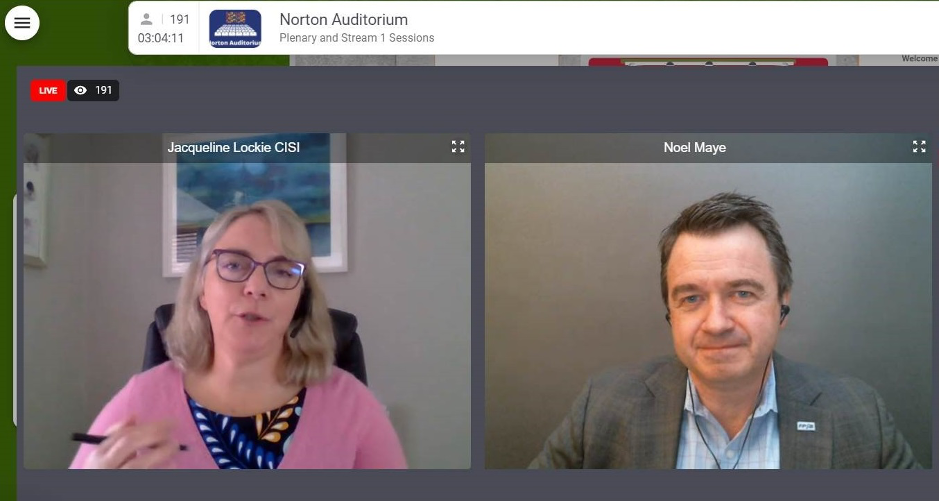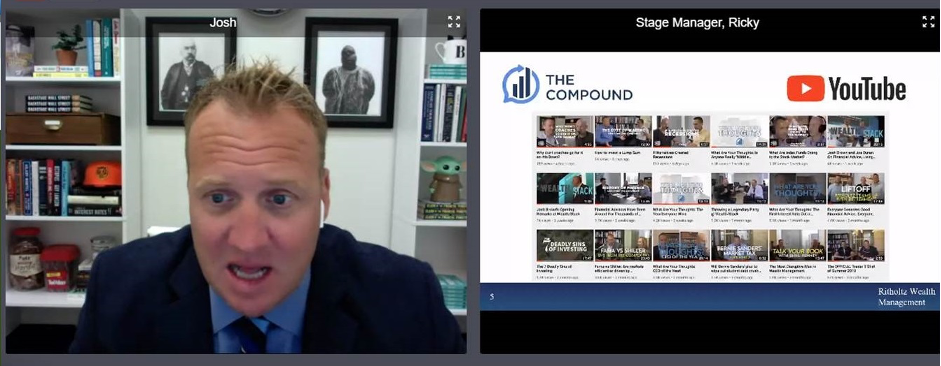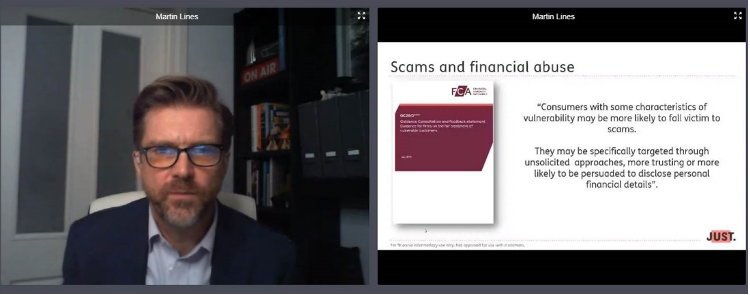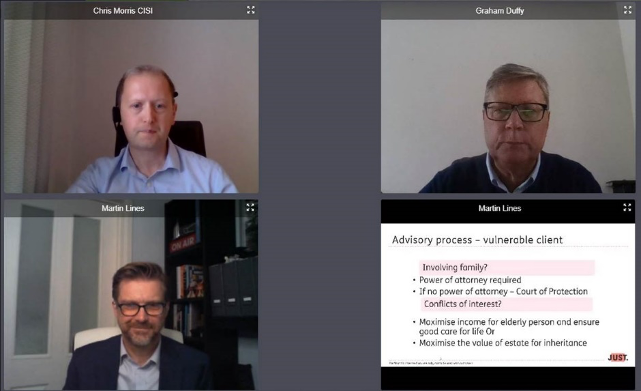The inaugural virtual CISI Financial Planning Conference featured experts from around the world, with delegates enjoying networking at virtual round tables and breakout sessions
by William Monroe and Bethan Rees
On Tuesday 13 October, CISI chair Michael Cole-Fontayn MCSI welcomed 190 delegates from around the world to the CISI Financial Planning Conference 2020. Michael said that the 32nd annual Financial Planning Conference was taking place amid an “extraordinary” situation, and he highlighted the importance of “bringing everybody together at this time”.
The virtual set-up featured three conferencing halls: the Norton Auditorium, the Sellon Lounge, and the Cann Suite (main image). Before the conference began officially with Michael’s welcome, delegates arriving at the Norton Auditorium were greeted by a large ‘hall’ featuring a number of tables of six in the middle, with smaller side tables of two where delegates could chat on a one-on-one basis. When entering, delegates were automatically seated at one of the virtual tables and were shown around the innovative virtual format over ‘coffee’. The Norton Auditorium had three levels, so delegates could use ‘elevators’ and move around floors to interact with each other. They were able to move freely between tables and interact with fellow financial planners using their camera and microphone. They could also visit dedicated sponsor tables at the sides of the hall.
Jacqueline Lockie CFP™ Chartered FCSI, outgoing head of financial planning at the CISI, pointed out some features of the virtual conferencing platform, including the general chat function, a private chat function, and a space to ask questions of speakers at the end of each session via a Q&A chat format.
After Michael’s welcome, Jacqueline introduced Noel Maye, CEO of the Financial Planning Standards Board (FPSB), who gave the opening keynote address. He said that the Covid-19 pandemic has made digital imperative, and he encouraged financial planners to adapt their practices and embrace technology in order to be relevant to next generation (next gen) clients. As one of his presentation slides asked, ‘will you be swiped left, or right?’
Noel made it clear, however, that despite the technology-driven landscape, the value proposition of financial planning lies in personalised human engagement, with the client at the centre. Noel then took questions from the floor, which had been typed in the Q&A chat.

How to be a fully virtual financial planner
A session later that afternoon in the Norton Auditorium was titled ‘How to be a fully virtual financial planner’. Speaker Josh Brown, CEO of US-based Ritholtz Wealth Management (RWM), explained that a digital approach had served RWM well long before the pandemic hit. Pre-Covid-19, more than half of the firm’s employees had worked remotely, while a significant proportion of clients had not been met in person. RWM’s list of tech tools, innovations and social media platforms that it uses is a long one, numbering 36, but Josh predicted that this ‘tech stack’ could double in size over the next ten years.
Like Noel, Josh highlighted the importance of reaching next gen clients, who he referred to as HENRYs (high earners not rich yet). This demographic, according to Josh, spend a quarter of their waking hours on their phones. It follows that if you want to reach them, you have to be in their phones. Josh emphasised the importance of video and audio – such as podcasts – for engaging this younger age bracket. He said that YouTube is a key medium for RWM, as it’s a more accessible way to hear about financial concepts for this younger demographic.
A short break at the halfway point allowed attendees to chat through the concepts discussed on their respective tables, before Josh returned to the stage.
He predicted that many of the new virtual conventions that have characterised interactions with clients and employees will endure in a post-pandemic landscape, as “we’ve discovered just how well we can do this job in an entirely virtual environment”. As he pointed out, “People like convenience, and dealing with a financial planner virtually is convenient.” Josh highlighted that the new virtual way of working has conserved both time and energy. It is, he said, one of the silver linings to come out of the pandemic.

Financial abuse, coercion and assessing mental capacity globally
Also on Tuesday afternoon, Martin Lines, business development director, and Graham Duffy, care specialist, both from Just, a financial services group focusing on the UK retirement income market, led a session on financial abuse, coercion and assessing mental capacity.
Martin kicked off the session, focusing on what the common indicators for both financial abuse and coercion are, and how financial planners handle them if any of these issues become apparent in a client meeting. He highlighted the four areas that can be triggers of consumer vulnerability. These are health (such as anxiety and stress), life events (experiences and changes such as caring responsibilities and death), financial resilience (how someone could cope financially if there's a change to their situation) and capability (how mentally capable someone is – more on this later). These four triggers can make a consumer more vulnerable to falling victim to scams, as they could make them either more easily targeted, or more trusting.

"A fundamental step is to keep in touch with clients and make sure they’re aware of what scams they could fall victim to," Martin said. He went on to explain that financial scams might be perpetrated by someone the victim knows, referencing statistics from UK Finance's 2019 report It's your money:
- One in five women in the UK have experienced financial abuse from a current or former partner.
- One in seven men in the UK have experienced financial abuse from a current or former partner.
- One in three or more victims didn’t tell anyone at the time.
Financial abuse in intimate relationships is a type of coercion, which is a criminal situation, explained Martin. It can take many forms, from stopping a person from working and being asked to account for all spending, to taking out credit cards or loans in your name or putting all bills in your name, he says.
Financial planners should look out for signs of financial abuse and coercion in their meetings with clients – sometimes it might just be a sense that something "doesn't feel right". Signs could include one person dominating the conversation, expressing high levels of concern about where money is coming from, prioritising buying non-essential things, leaving a job when they liked it, or unexplained withdrawals and unusual changes in financial documents.
Graham finished the session by introducing the topic of mental capacity – to what extent people can make their own decisions – and how financial planners should deal with a client who they think may lack mental capacity. He introduced a mnemonic, BRUCE, to help financial planners identify a lack of mental capacity and support their client.
- Behaviours – what is the client saying or doing? Are they being illogical? Are there signs of triggers or influence? Are they struggling with decision-making?
- Remembering – you can offer to repeat, or put in writing, what you have discussed. Is help needed for a better grasp of understanding?
- Understanding – check their understanding and offer to explain again. Do they have someone to help them?
- Communicating – do they have a preferred time for communication? Consider factors such as medication and age, which can impact understanding.
- Evaluating – weigh up the options with the client and go through the options again. Do they need to consult a third party?

How culture can drive growth in your business
On Wednesday 14 October, Barry Horner CFP™ Chartered MCSI, CEO of Paradigm Norton Financial Planning, hosted a session on how the culture of a business is key in determining the direction of travel, sharing decades of experience with delegates.
Barry began by explaining the importance of culture in a business, describing it as an ‘elusive lever’. Firms may describe culture as:
- what goes on when nobody's looking
- the firm's social order or silent language
- how it's done around here.
Barry referenced reports from Deloitte, among others, citing data such as:
- 41% of those seeking a new role search for information on the culture of the company before they join
- 95% say great culture is more important to them than pay
- financial planning firms that focus on culture, rather than compliance, have better levels of compliance.
Culture doesn't happen overnight, "it needs to be seen as a process," said Barry. Central to the process of a culture change is determining the values you share in the business, he said. This could be anything from innovation to flexible working, informality to autonomy. He said that flipcharts are a good place to start, and recommended creating a list of values that the company believes in, including what's important to them.
Barry rounded off his session with his top tips for driving culture in a firm:
- Where to start – evaluate where you are now and ask yourself soul-searching questions. What do we believe? What do we like, and don’t like? Are we doing the things we need to do to support a strong culture?
- Be collaborative – engage the whole firm and give everyone a voice.
- There is no such thing as overcommunication – the entire firm needs to know the company’s values, recite them, and hopefully live by them. Communication makes or breaks culture.
- Don’t expect culture change overnight – it is a process, not an activity.
- Culture is much more a matter of doing than saying.
- Joining a new firm – learn about the culture of a firm before you join.
The sessions outlined above are just a few of the many insightful talks and discussions delegates heard at the CISI's Financial Planning Conference 2020. There were plenty more sessions on offer across the two days, covering subjects such as financial planning for millennials, the practical impact of ethics when giving advice and hiring, training and keeping the right people, giving delegates plenty of food for thought.